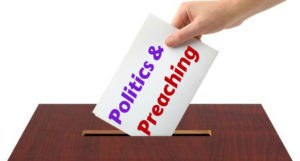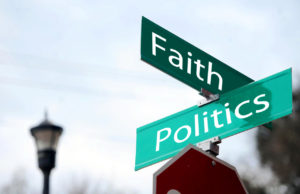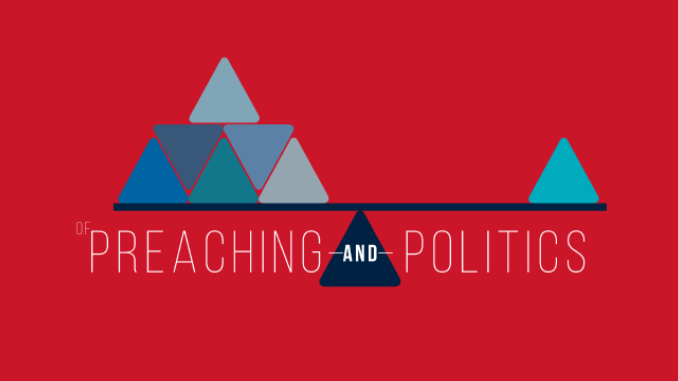Preaching About Politics
Preaching About Politics
Our world is more and more divided by political ideology. How do you go about preaching about politics in such a climate? Should you preach about politics at all? That will be the subject of the next couple of posts.
The Problem With Preaching About Politics
It’s a little after 7 am as I write this. I’ve just been reading the news, and read a report about Father William  Corcoran, a priest in a suburb of Chicago. In his homily this past Sunday, he decried what had happened in the attack on the capitol of the United States last week, and interestingly, said that he was partially responsible for what happened. Here’s how Mary Schmich, reporter for the Chicago Tribune described his message.
Corcoran, a priest in a suburb of Chicago. In his homily this past Sunday, he decried what had happened in the attack on the capitol of the United States last week, and interestingly, said that he was partially responsible for what happened. Here’s how Mary Schmich, reporter for the Chicago Tribune described his message.
“I too want to engage in finger pointing,” said Father Bill, as he’s known in the parish, “and point to myself, and accept personal responsibility in part for what happened in the Capitol this past Wednesday.”
Corcoran went on to name the many times he failed to speak out about Donald Trump’s ugly behavior. Like when the president talked about grabbing women. When he mocked a disabled reporter. When he dissed John McCain.
He talked about the German Catholic Church’s failure to condemn Adolf Hitler, about the failure of the American Catholic Church when faced with the sexual abuse committed by priests.
“As President Trump has lied about so many things,” he told the congregation, “I have never spoken out, and fear we are teaching the young that truth and facts do not matter.”
What was the result? People walked out. About 30 of them by his rough count. Schmich goes on to say,
Corcoran’s struggle with speaking out reflects the struggle many Americans have faced during Donald Trump’s tenure. If speaking out against the president hurts people you care for, do you do it? Do you do it at the risk of being misunderstood or vilified? If you do it, how do you do it, and when?
To Preach or Not To Preach About Politics
Those are the questions, right? Do we engage in the practice of preaching about politics in our churches,  especially when people may choose to leave? This is a tough question in this day. In the United States the question is being faced with a growing sense of urgency as we’ve seen our political system almost collapse. I suspect that the same questions are being faced by those of you who are in other countries as well. It feels almost dangerous in a time when we are so divided, doesn’t it? As I wrote in an early post in this blog, Words Have Power! Since we know that, how should that affect our decision in this regard?
especially when people may choose to leave? This is a tough question in this day. In the United States the question is being faced with a growing sense of urgency as we’ve seen our political system almost collapse. I suspect that the same questions are being faced by those of you who are in other countries as well. It feels almost dangerous in a time when we are so divided, doesn’t it? As I wrote in an early post in this blog, Words Have Power! Since we know that, how should that affect our decision in this regard?
We must engage in preaching about politics
So, do you preach about politics, or not? First, I want to answer that question this way: Yes! I remember only a  few things that were said about preaching when I was in seminary. However, I do remember the description of preaching as someone who has the Bible in one hand and the newspaper in the other as I prepare sermons. In other words, the messages that we preach must be true to what God said in his Word, but they also must relate to the news of the day. If this is not true, we will appear irrelevant to people in our community.
few things that were said about preaching when I was in seminary. However, I do remember the description of preaching as someone who has the Bible in one hand and the newspaper in the other as I prepare sermons. In other words, the messages that we preach must be true to what God said in his Word, but they also must relate to the news of the day. If this is not true, we will appear irrelevant to people in our community.
We must not engage in preaching about OUR politics
In my preparation for this post, I read a statement by Susan Reisert in a post by Christian Century magazine. She said,
In divinity school I heard the pastor of a nearby church preach about an upcoming election, declaring in no uncertain terms how he believed the individuals of the congregation should vote on one of the issues on the ballot.
This, I believe, is the wrong approach to preaching about politics in a local church.
So, what do you do? In the next post we’ll consider the politics of Jesus as a further exploration of this topic. For now, you might consider this earlier post on what to do when the critics come. And, here’s Tim Keller in a 2012 video about how he approaches politics in church, for your further thought on this subject.



